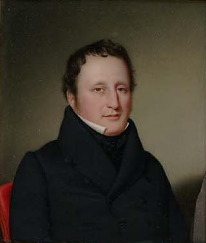Mordecai Manuel Noah
(1785 – 1851)

Mordecai Manuel Noah was an American editor, politician, and playwright. Noah, who was probably the most influential Jew in the United States in the early 19th century, was born in Philadelphia. His father, Manuel Noah (c. 1755–1822), was a bankrupt itinerant merchant, and Mordecai Noah was raised by his maternal grandfather, Jonas Phillips. After apprenticeship as a gilder and carver, Noah became a clerk in the U.S. Treasury through the assistance of Robert Morris (1734–1806), the financier and senator.
Noah began his political career in Philadelphia in 1808 when he, along with other “Democratic Young Men,” supported the Republican candidate, James Madison, for president. A year later Noah went to Charleston, where he edited the City Gazette. A war “hawk,” he strongly supported the War of 1812.
In 1813, he was appointed consul at Tunis but was recalled two years later after he was accused of misappropriation of funds, though the charges were never proved. On his return to the United States, Noah established himself permanently in New York with the help of his uncle Naphtali Phillips, publisher of the National Advocate, which ardently supported the Democratic Party of New York County. Noah became the editor of the newspaper in 1817, giving him access to the Tammany Society. He was appointed high sheriff in 1822 and two years later was elected grand sachem of Tammany.
When Phillips sold the National Advocate in 1824, Noah became the publisher of the New York National Advocate. He broke with Tammany over its opposition to De Witt Clinton, then commissioner of canals, and in 1825 supported Clinton for governor. Noah continued to oppose Tammany in the paper he established, the New York Enquirer, published 1826–29. Critical of Andrew Jackson, particularly of his attack on the U.S. Bank, he associated himself with the newly created Whig Party in 1834, and as publisher and editor of the Evening Star, a Whig paper, demonstrated anti-immigrant and anti-Catholic bias. When the Native American Party of 1835–36, the forerunner of the Know-Nothing Party, was created, he was one of its chief supporters. He also supported the Texas revolt of 1836 against Mexico and angrily attacked the abolitionist cause. In 1841, he became a judge of the Court of Sessions.
Noah was a prolific playwright; many of his plays reflected his patriotic fervor. His first play, Fortress of Sorrento (written 1808), was followed by, among others, She Would Be a Soldier (1819); Siege of Tripoli (1820), also produced as Yuseff Caramalli; and Marion, or the Hero of St. George (1822).
Noah’s interest in Jewish affairs drew him into activities on behalf of the congregations of Mikveh Israel in Philadelphia and Shearith Israel in New York. Long taken by the idea of a Jewish territorial restoration, Noah, in 1825, helped purchase a tract of land on Grand Island in the Niagara River near Buffalo, which he named Ararat and envisioned as a Jewish colony. Though the proposal elicited much discussion, the attempt was not a success and Noah’s pretensions as ruler were ridiculed. After the failure of the Ararat experience, Noah turned more strongly to the idea of Palestine as a national home for Jews. As the best-known American Jew of his time, Noah in 1840 delivered the principal address at a meeting at B’nai Jeshurun in New York protesting the Damascus Affair.
BIBLIOGRAPHY
I. Goldberg, Major Noah: American Jewish Pioneer (1937); L.M. Friedman, Pilgrims in a New Land (1948), 221–32; DAB, s.v.; S.J. Kohn, in: AJHSQ, 59 (1969), 210–4; B.D. Weinryb, in: The Jewish Experience in America, 2 (1969), 136–57; R. Gordis, ibid., 110–35; I.M. Fein, ibid., 82–101.
Source: Encyclopaedia Judaica. © 2007 The Gale Group. All Rights Reserved.
Photo: John Wood Dodge, Public domain via Wikimedia Commons.


